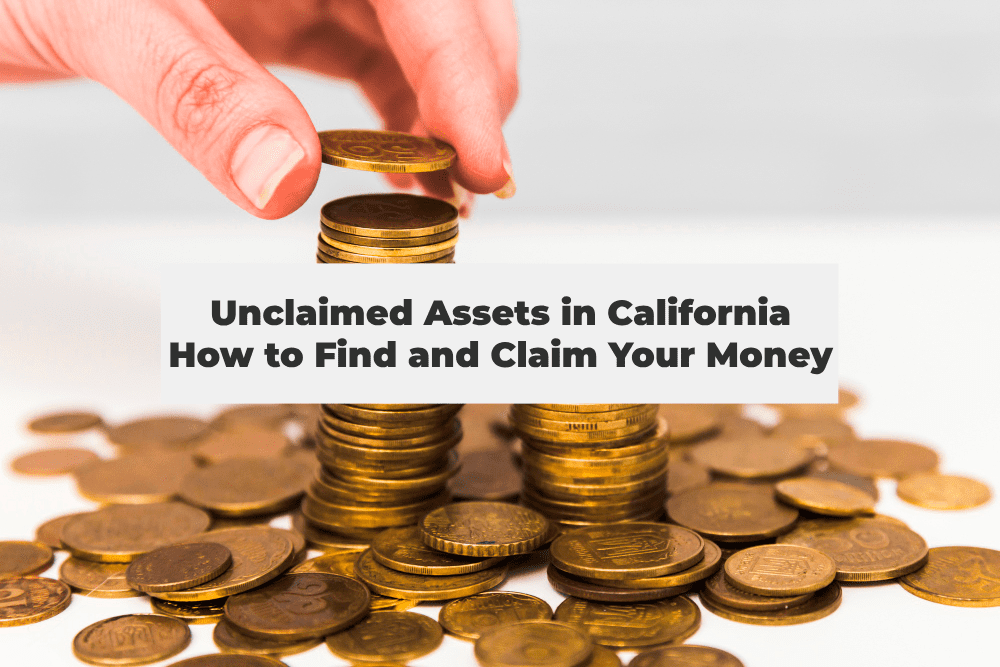Every year, millions of dollars in unclaimed assets are turned over to the state of California. These assets can include things like uncashed checks, forgotten bank accounts, unclaimed insurance policies, and more. While the idea of unclaimed assets might sound like something that only happens to other people, the truth is that it can happen to anyone. In this blog, we’ll explain what unclaimed assets are, how they end up with the state, and what you can do to find and claim your assets. We’ll also provide tips on how to avoid having your assets go unclaimed in the future. So let’s dive in!
What Are Unclaimed Assets?
Unclaimed assets, also known as unclaimed property, refer to financial accounts or items of value that have had no activity or contact with the owner for a certain period. This can include a wide range of assets, such as:
- Bank accounts (checking and savings)
- Uncashed checks (payroll, tax refunds, etc.)
- Stocks and bonds
- Insurance policy proceeds
- Utility deposits
- Safe deposit box contents
How Do Assets Become Unclaimed?
Assets typically become unclaimed due to a lack of communication between the asset holder and the owner. This can happen for several reasons:
- Change of Address: The owner moved and forgot to update their address with the financial institution.
- Death of the Owner: If the owner passes away and no one is aware of the asset, it can go unclaimed.
- Forgetting About the Asset: It’s easy to lose track of old bank accounts, insurance policies, or stocks, especially if they are not part of your day-to-day finances.
- Name Change: If the owner has changed their name (due to marriage, for example) and didn’t update their records, it can cause communication issues.
How to Search for Unclaimed Assets in California
- Visit the California State Controller’s Office Website: The state of California has an easy-to-use online database where you can search for unclaimed property. You can access it here (link to California State Controller’s Office unclaimed property search page).
- Enter Your Information: You can search by entering your name, business name, or property ID if you have it. Be sure to try variations of your name, especially if you have changed your name or used different names in the past.
- Review the Results: The search will display any unclaimed assets that match the information you entered. If you find an asset that belongs to you, you can begin the claims process directly through the website.
- Submit a Claim: To claim your asset, you’ll need to provide proof of identity and proof of ownership. This might include copies of your ID, proof of address, and any documentation that links you to the asset. The website will guide you through the process and provide instructions on what documents you need to submit.
What Happens After You Submit a Claim?
Avoiding Unclaimed Assets in the Future
- Keep Your Contact Information Updated: Whenever you move or change your name, make sure to update your address and contact information with all your financial institutions, insurance companies, and utility providers.
- Review Your Financial Accounts Regularly: Set aside time every year to review all your financial accounts, including bank accounts, insurance policies, and investments. Make sure you know what’s where and how to access it.
- Keep Records of All Accounts: Maintain a list of all your accounts, including account numbers, contact information for the institution, and any relevant policy numbers. Share this information with a trusted family member or advisor.
- Consider Consolidating Accounts: If you have multiple small accounts, consider consolidating them. This makes it easier to manage your finances and reduces the chances of forgetting about an account.
- Communicate with Family Members: Make sure your family members know about your accounts and assets. This is especially important if you have a will or estate plan. Knowing where your assets are can help prevent them from becoming unclaimed.
Tax Implications of Claiming Unclaimed Assets
- Interest-Bearing Accounts: If the unclaimed asset is an interest-bearing account, you may owe taxes on the interest earned.
- Stocks or Bonds: If you claim stocks or bonds, you may owe capital gains taxes if you sell them.
- Insurance Payouts: Some insurance payouts may be taxable, depending on the type of policy and how the proceeds are distributed.




